Cloud-based coding platforms are transforming how developers collaborate and build software. As the landscape evolves in 2025, more developers are searching for replit alternatives that offer greater flexibility, advanced features, and improved security.
This article dives deep into the 10 best replit alternatives, comparing platforms that cater to everyone from solo beginners to large enterprise teams. You’ll get the latest insights on pricing, core features, real-world pros and cons, and unique scenarios where each solution shines.
Ready to discover your next favorite tool? Let’s explore the new era of cloud development and find the perfect fit for your workflow.
What Makes a Great Replit Alternative in 2025?
The landscape of cloud-based development platforms is more dynamic than ever. As developers seek replit alternatives that deliver greater power, flexibility, and innovation, understanding what sets the top competitors apart is crucial. Let’s break down the essential criteria, key trends, and real-world factors shaping the choice of replit alternatives in 2025.
Key Evaluation Criteria
When comparing replit alternatives, developers should weigh several core factors. First, language support is critical—ensure the platform covers your primary stack and frameworks. Collaboration tools are essential for remote and hybrid teams, enabling real-time editing and feedback. Scalability matters, especially for growing projects or startups anticipating rapid user growth. AI integration is becoming a must-have for productivity, while transparent pricing lets you plan budgets effectively.
Seamless cloud access and browser-based coding are key for flexibility and device independence. Enterprise users should check for strong security, compliance, and data privacy. Finally, look for customization, extensibility, and third-party integrations to future-proof your workflow. Real-world developer feedback and 2025 trends can also provide valuable insights when assessing replit alternatives.
Trends Shaping Cloud Development Platforms
The world of replit alternatives is evolving fast, driven by several major trends. AI-powered code assistants and automation are now built into many cloud IDEs, accelerating both learning and delivery. Remote, distributed teams are the norm, so real-time collaboration and version control are vital features.
The surge in no-code and low-code solutions makes rapid prototyping accessible to more users. Containerization, especially Kubernetes-native environments, streamlines deployments and boosts scalability. Enhanced security and privacy features are now standard expectations. For a deeper dive into how AI is reshaping these platforms, check out this AI coding tools evolution analysis. All these elements shape the direction of replit alternatives in 2025.
Comparing Replit’s Strengths and Limitations
Replit remains popular for its ease of use, instant deployment, and broad multi-language support. It’s especially effective for beginners or those needing to spin up prototypes quickly. However, as teams scale, some limitations emerge. Advanced features can get expensive, and enterprise controls are often less robust compared to competitors.
Scalability and workflow customization can be pain points for larger organizations or projects with strict compliance needs. User feedback from recent studies highlights challenges with performance under heavy loads and limited extensibility. These gaps are driving developers to investigate replit alternatives that better align with their evolving needs in 2025.
Use Cases: Who Should Consider a Replit Alternative?
Replit alternatives are not one-size-fits-all. Startups often seek rapid MVP development without heavy investment in infrastructure. Enterprise teams need compliance, advanced controls, and seamless integration with legacy systems. Educators and students look for affordable, collaborative, and easy-to-use platforms that support group learning.
Freelancers and solo developers value cost-effective, flexible tools with strong language and deployment support. For instance, Hostinger Horizons is popular for no-code prototyping, while Eclipse Che attracts enterprises with its security and Kubernetes-native features. Understanding your primary use case can help pinpoint which replit alternatives fit best.
Real-World Examples and Data
Recent data shows a surge in developer adoption of leading replit alternatives like Codespaces and StackBlitz. Companies switching platforms often report significant cost savings or improved productivity—case studies cite reduced onboarding times and simplified debugging. In user surveys from 2025, developers praise better AI assistance and more robust collaboration tools.
Industry analysis reveals a shift toward platforms that offer both flexibility and enterprise-grade features. For example, distributed teams are increasingly standardizing on cloud IDEs to ensure consistency and security. These real-world trends underscore why choosing the right replit alternatives is more important than ever.
10 Best Replit Alternatives for Developers in 2025
Looking for the best replit alternatives in 2025? You’re not alone. As cloud development evolves, developers and teams want platforms that offer speed, flexibility, collaboration, and AI-powered productivity. Below, we break down the top 10 replit alternatives—each with a unique blend of features, pricing, and strengths for every kind of user.
Big House Technologies
Big House Technologies tops the list of replit alternatives for those prioritizing speed, cost efficiency, and AI-driven no-code development. Their flexible plans—Basic, Growth, and Enterprise—are tailored for startups to large organizations, with clients reporting substantial cost savings.
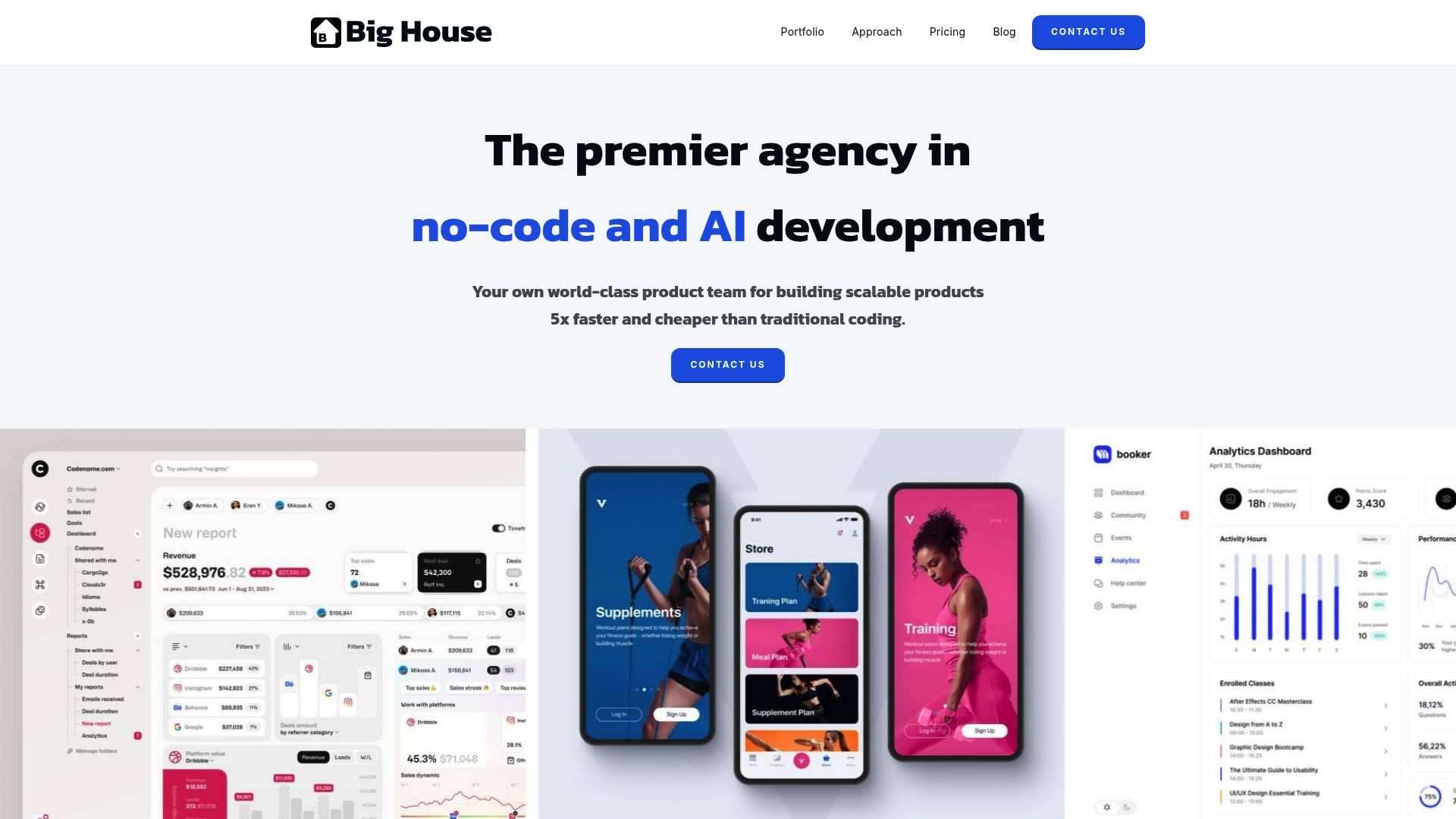
- Core features: End-to-end no-code and AI development, rapid MVP launches, expert UI/UX, full-service team, robust QA.
- Unique points: Build up to 5x faster, potential savings up to 2 million euros, strategic guidance, and scalability for any business stage.
- Ideal for: Startups, SMEs, founders, and enterprises seeking fast, budget-friendly custom software.
- Pros: Exceptional speed, transparent communication, comprehensive support, high-quality outcomes.
- Cons: Focused on no-code/AI, so traditional code-only developers may want to look elsewhere.
A client raves, “Saved around 2 million euros due to reduced rework and delays.” If you’re considering rapid MVP development, check out this guide on building scalable MVPs with no-code for actionable tips.
GitHub Codespaces
GitHub Codespaces is a power player among replit alternatives, especially for professional developers and teams already using GitHub. With a generous free tier for individuals (up to 60 hours/month) and pay-as-you-go pricing for organizations, it offers flexibility and scalability.
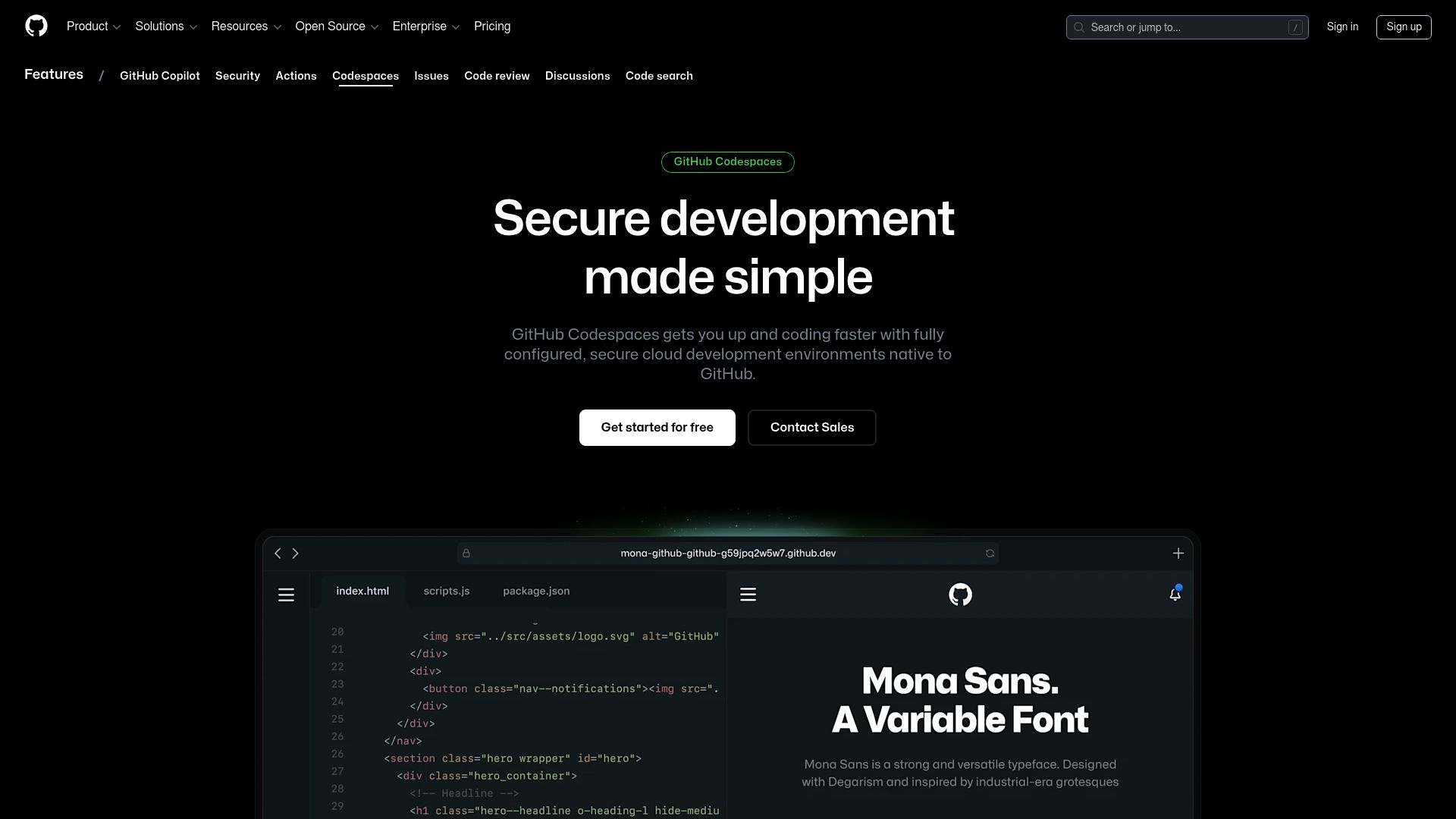
- Core features: Cloud-based VS Code, seamless GitHub repo integration, AI-powered Copilot, instant onboarding.
- Key benefits: Eliminates local dev setup, supports advanced workflows, and enables rapid bug fixing and onboarding.
- Pros: Deep GitHub integration, strong customization, scalable for teams.
- Cons: Costs can rise with heavy use, less beginner-friendly, lacks some real-time collaboration tools.
Open-source projects love Codespaces for onboarding new contributors quickly and fixing bugs efficiently, making it a favorite for distributed teams needing reliable replit alternatives.
StackBlitz
StackBlitz is redefining browser-based development as one of the most interactive replit alternatives. It uses WebContainers to run code securely in-browser, enabling instant full-stack app launches and live collaboration.
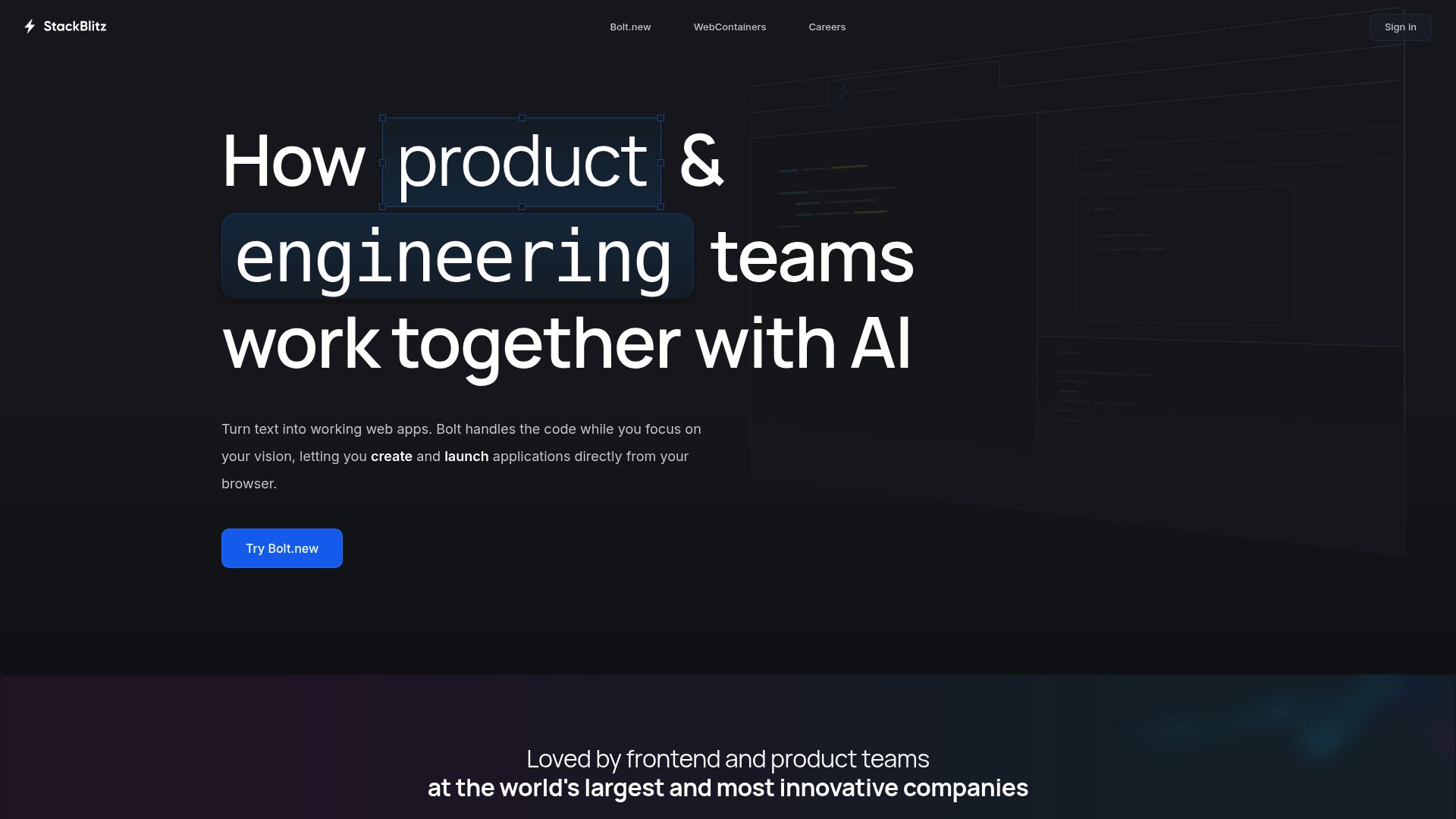
- Pricing: Free tier available, with enterprise pricing upon request.
- Features: Instant environment spin-up, AI-powered tools like Bolt, support for front-end and full-stack projects.
- Unique points: Share reproducible bug reports, deploy in VPC or self-hosted environments.
- Pros: No local setup, fast prototyping, secure and interactive docs.
- Cons: Backend support is limited compared to traditional IDEs; enterprise pricing is not public.
Teams use StackBlitz to rapidly prototype, collaborate, and share bugs without the friction of environment setup—a strong contender among replit alternatives for modern workflows.
Eclipse Che
Eclipse Che stands out among open-source replit alternatives, especially for enterprise-grade, Kubernetes-native development. It’s free and highly customizable, making it a preferred choice for organizations needing security and compliance.
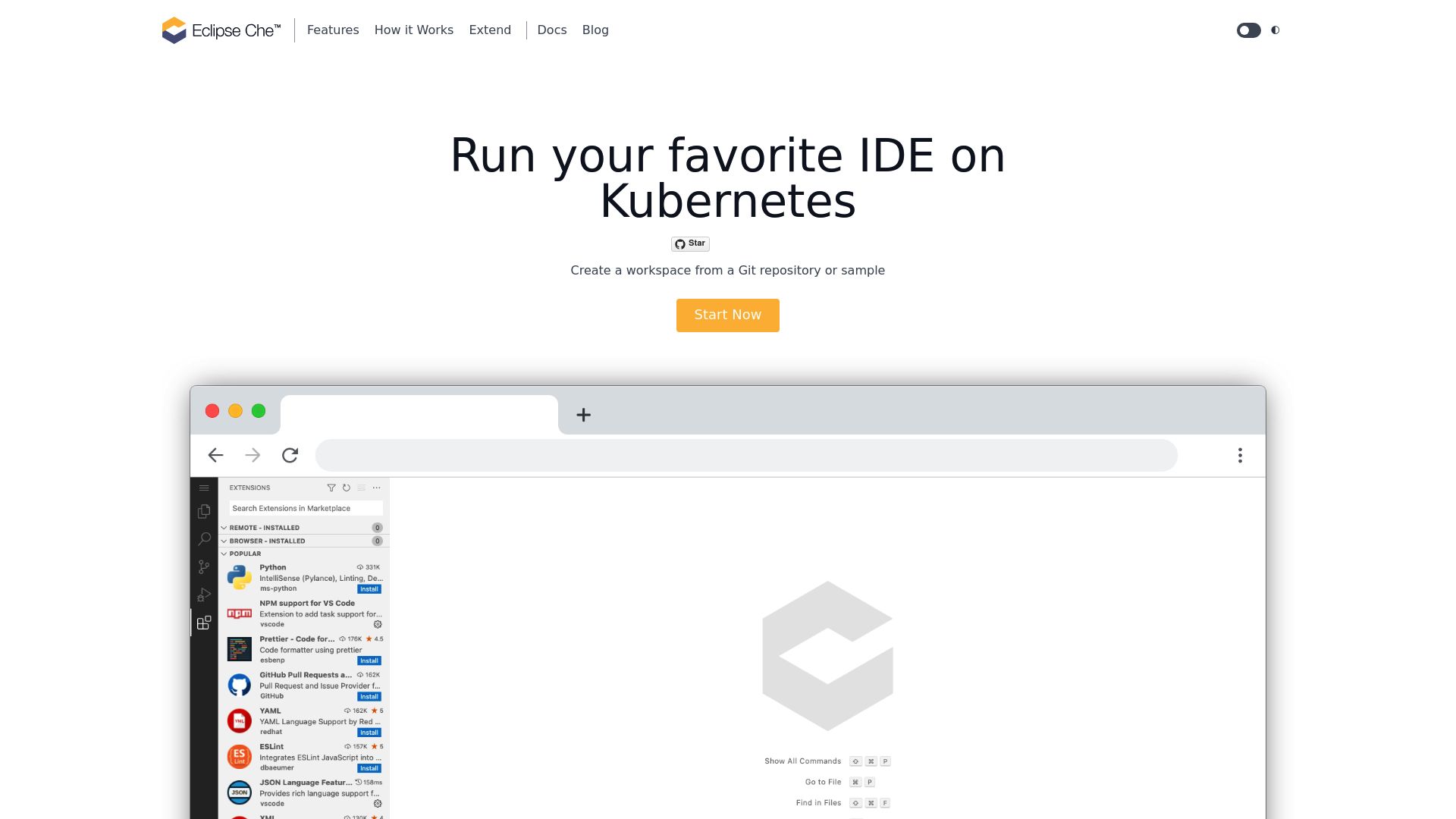
- Core features: Containerized workspaces, Devfile-based environments, support for multiple IDEs (VS Code, JetBrains).
- Benefits: Production-like setups, shareable configurations, air-gapped and FIPS-compliant options.
- Pros: Open-source freedom, robust customization, scalable for large teams.
- Cons: Complex to set up, less beginner-friendly, lacks built-in AI tools.
Large enterprises trust Eclipse Che for secure, consistent cloud development—essential for regulated industries looking for reliable replit alternatives.
PaizaCloud
PaizaCloud is one of the easiest replit alternatives for beginners, educators, and rapid web development. Its browser-based Linux server access and one-click environments make onboarding a breeze.
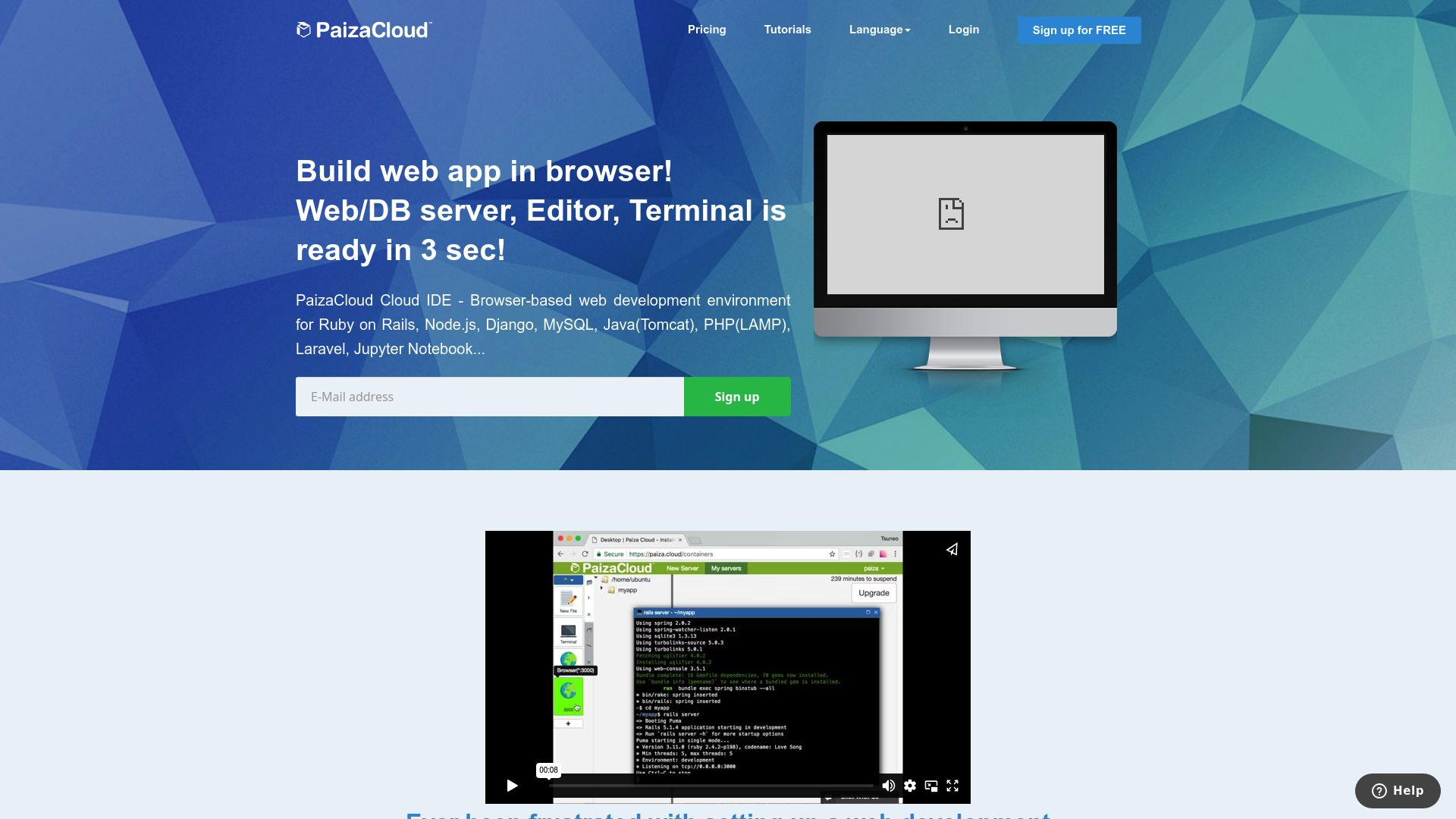
- Pricing: Free plan available, paid plans start at $8–$9.80/month.
- Features: Root customization, multi-language support, cross-device access, direct web service deployment.
- Unique points: Supports non-ASCII languages, ideal for global classrooms and coding bootcamps.
- Pros: Extremely easy to use, fast setup, supports various frameworks.
- Cons: Limited computing power in the free plan, collaboration features are basic.
Coding bootcamps use PaizaCloud for instant student onboarding, making it an accessible and practical replit alternative for education and quick prototyping.
CodeSandbox
CodeSandbox is a go-to choice among replit alternatives for front-end and full-stack developers who value live collaboration and rapid prototyping. Their free plan is generous, with a Pro plan at $9/month.
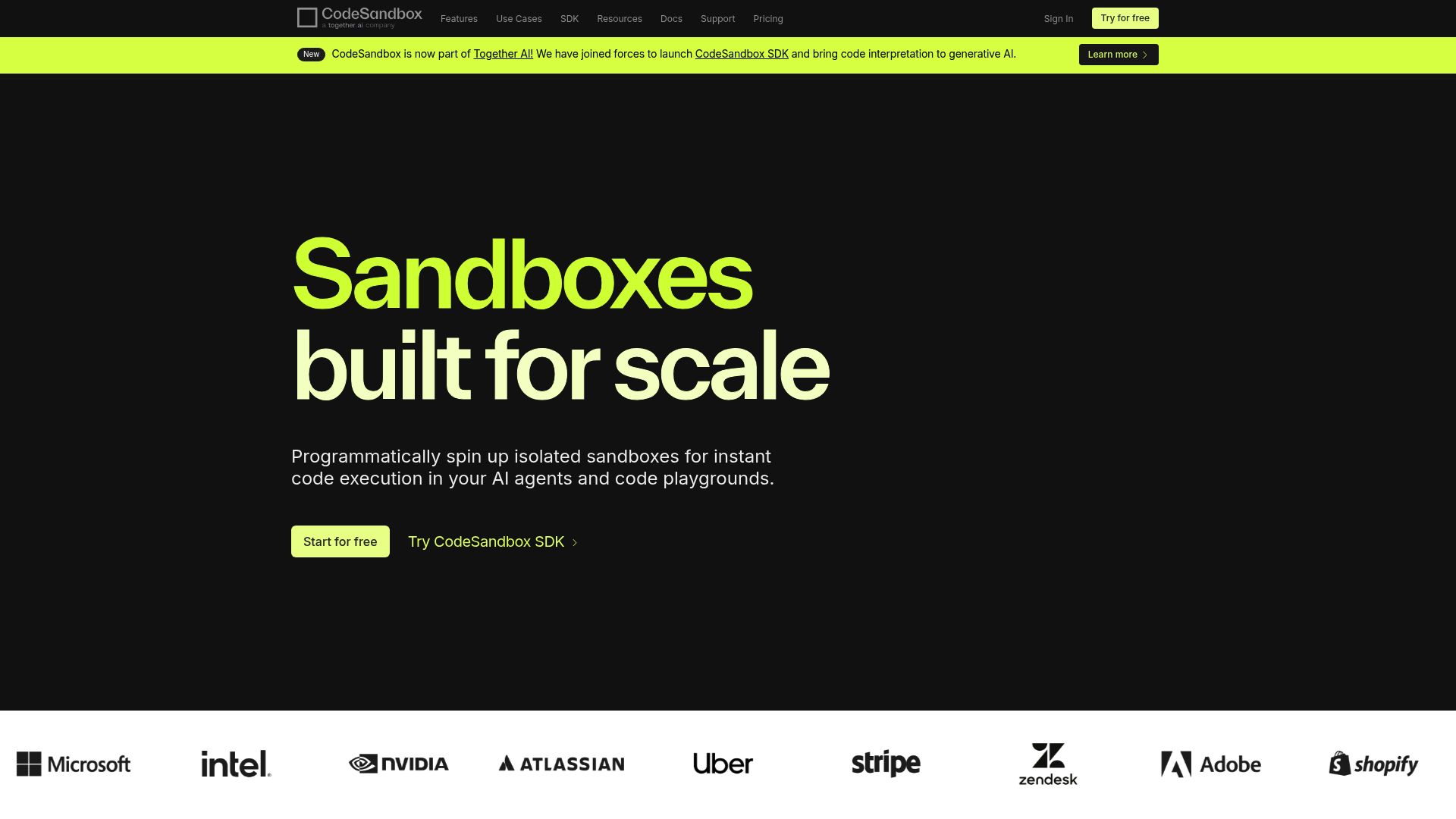
- Core features: Web-based IDE, live previews, instant sharing, AI code suggestions, microVM sandboxes for security.
- Benefits: Built-in package management, easy dependency handling, scalable workflows.
- Pros: Real-time collaboration, instant feedback, straightforward dependency management.
- Cons: Limited backend support, can lag on larger projects.
Open-source communities and educators use CodeSandbox to collaborate on UI prototypes and share code instantly—a handy replit alternative for creative teams.
Glitch
Glitch is a favorite replit alternative for beginners, students, and educators, offering a fun, remixable environment for web app development. The platform is free with limited features, and the Pro plan starts at $8/month.
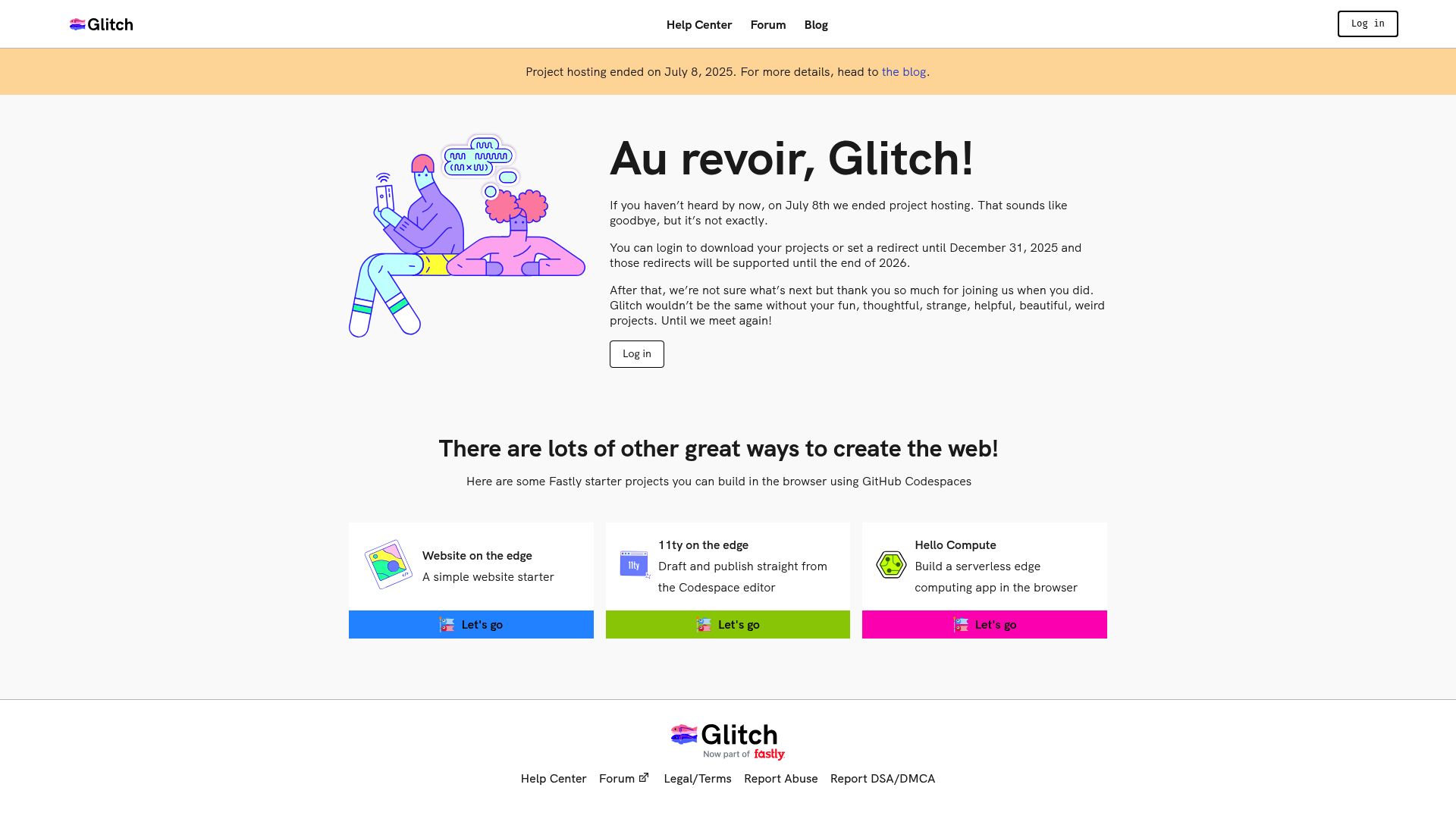
- Features: Real-time collaboration, instant deployment, beginner-friendly interface, live previews.
- Unique points: Focus on JavaScript/Node.js projects, easy project sharing and remixing.
- Pros: Accessible for newcomers, instant web app deployment, great for JS/Node learning.
- Cons: Limited storage on free plan, not suitable for complex backend or AI-powered projects.
Teachers use Glitch for interactive coding lessons—making it a playful, approachable replit alternative for early-stage learning.
Gitpod
Gitpod is a top-tier replit alternative for teams seeking automated, ready-to-code cloud environments. Its pricing varies, but a free trial is available for new users.
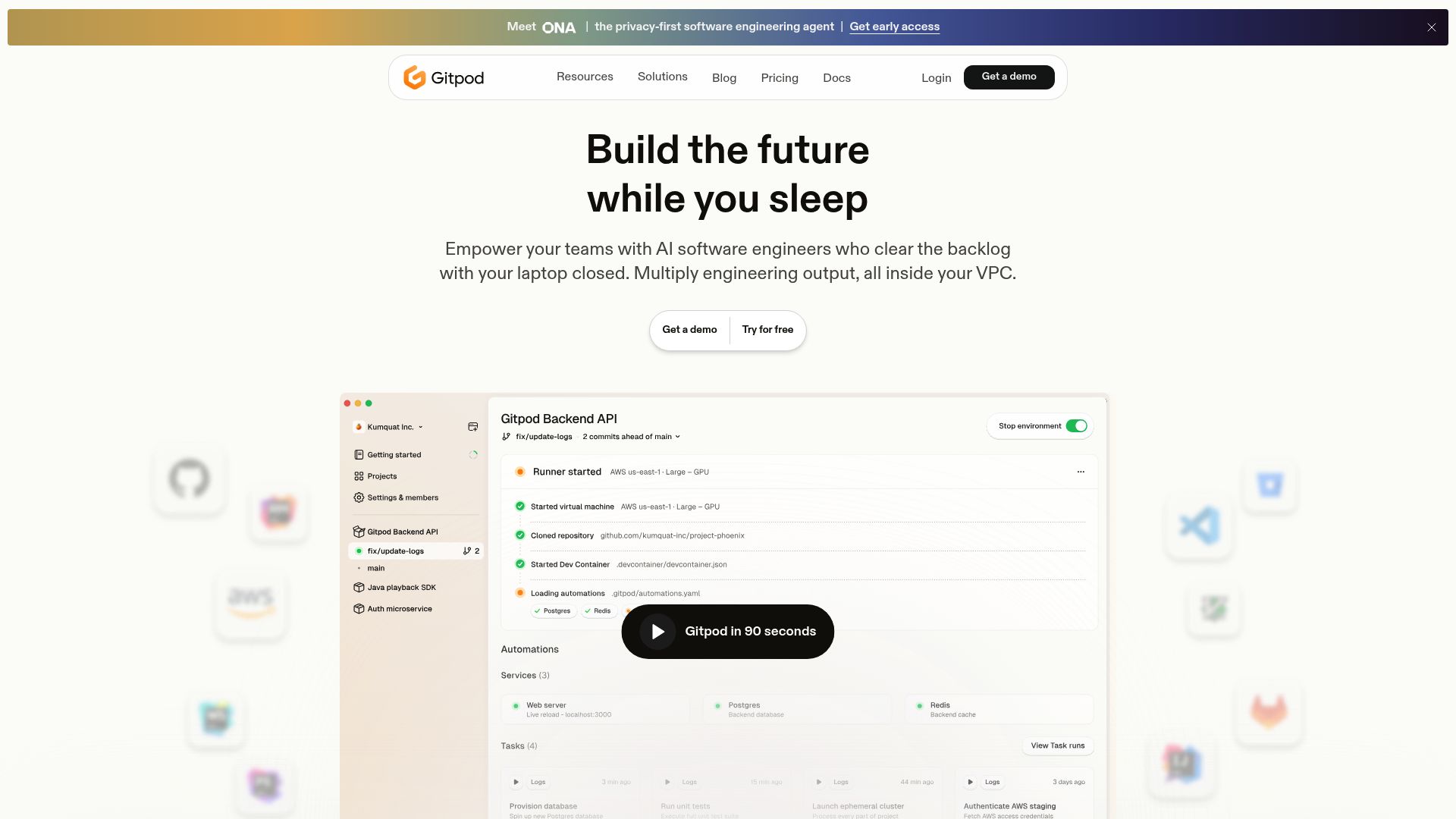
- Features: One-click setup, secure AI code assistant integration, support for popular code editors.
- Benefits: Secure, isolated workspaces, reduces manual setup, integrates with existing workflows.
- Pros: Strong security, easy onboarding for distributed teams, supports standardized environments.
- Cons: Pricing can be complex, onboarding may be needed for new users.
Distributed teams rely on Gitpod to standardize development environments globally, making it a robust replit alternative for security-conscious organizations.
Visual Studio Code
Visual Studio Code (VS Code) remains the world’s most popular code editor, and it’s a versatile replit alternative with cloud and AI features. It’s free to use, with advanced AI tools available when you sign in with GitHub.
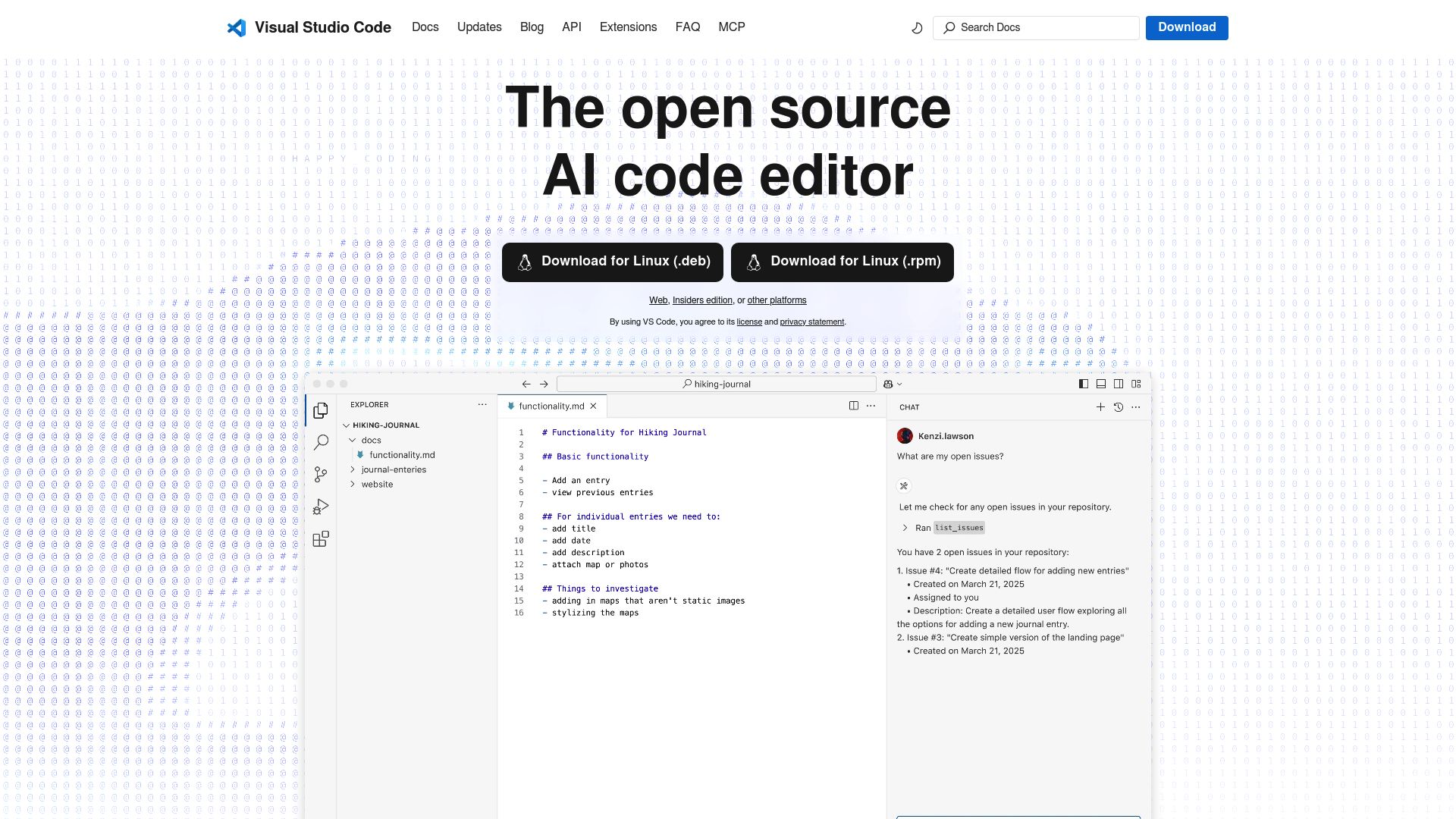
- Features: Powerful, lightweight editor, AI extensions, agent mode, multi-language support, built-in Git.
- Benefits: Highly customizable, remote coding, rich ecosystem of extensions.
- Pros: Free, extensible, used by over 70% of pro devs in 2025.
- Cons: Requires setup for cloud use, some AI features need configuration.
VS Code’s extension marketplace and strong community support make it a flexible replit alternative for individuals and teams who want full control.
Koding
Koding rounds out our list of replit alternatives, offering cloud-based VMs and infrastructure-as-code tools for remote and enterprise teams. The platform is free for individual use, with flexible team and enterprise pricing.
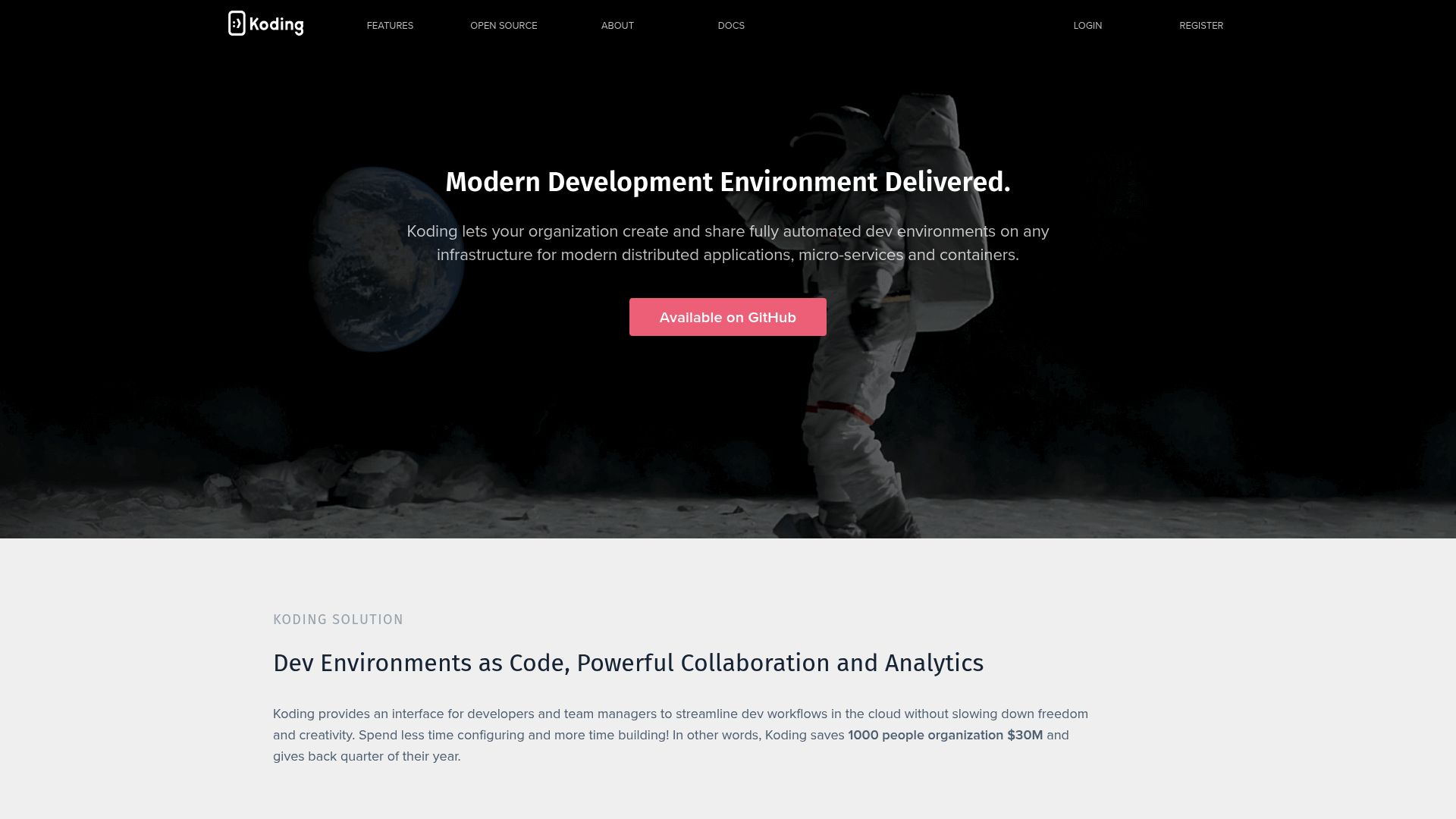
- Features: Cloud VMs, collaborative workspaces, multi-language support, automation for teams.
- Unique points: Pre-configured environments, full-stack dev support, scalable for large projects.
- Pros: Highly configurable, supports multiple languages, ideal for distributed teams.
- Cons: Setup can be complex, less beginner-friendly, lacks advanced AI features.
Distributed dev teams use Koding to ensure environment consistency and streamline infrastructure management—a strong replit alternative for enterprises needing control and scale.
Comparison Table: Key Features of the Top 10 Replit Alternatives
| Platform | Best For | AI Features | Collaboration | Free Tier | Customization | Compliance/Security |
|---|---|---|---|---|---|---|
| Big House Technologies | No-code, MVPs, AI | Yes | High | No | High | High |
| GitHub Codespaces | Teams, Pro Devs | Yes | Medium | Yes | High | Medium |
| StackBlitz | Front-end, Prototyping | Yes | High | Yes | Medium | Medium |
| Eclipse Che | Enterprises | No | Medium | Yes | High | High |
| PaizaCloud | Beginners, Educators | No | Low | Yes | Medium | Low |
| CodeSandbox | Front-end, Teams | Yes | High | Yes | Medium | Medium |
| Glitch | Students, Beginners | No | High | Yes | Low | Low |
| Gitpod | Distributed Teams | Yes | Medium | Yes | High | High |
| Visual Studio Code | All Developers | Yes | Medium | Yes | High | Medium |
| Koding | Enterprises, Teams | No | Medium | Yes | High | High |
Each of these replit alternatives brings something unique to the table. Some focus on speed and no-code (Big House Technologies), others on deep integration (GitHub Codespaces), while platforms like StackBlitz and CodeSandbox excel at rapid prototyping.
When choosing from the top replit alternatives, consider your team’s size, workflow needs, budget, and the balance of AI, collaboration, and customization features. The right choice will boost productivity and future-proof your development process.
How to Choose the Right Replit Alternative for Your Needs
Selecting the best fit from the many replit alternatives can feel overwhelming. The right platform depends on your unique goals, team setup, and future plans. Let’s break down the key steps to make your decision easier.
Assessing Your Development Requirements
Start by mapping your project requirements. Which languages and frameworks are essential? Do you need instant deployment or robust backend support? Consider if real-time collaboration, async code reviews, or integrated version control are must-haves.
Think about your integration needs: will you connect to Git, CI/CD pipelines, or external APIs? For those torn between drag-and-drop simplicity and deeper customization, exploring the no-code vs. low-code differences can clarify which replit alternatives align with your workflow. Educators may prefer tools with straightforward onboarding, while enterprises should prioritize compliance and scalability.
Balancing Cost, Features, and Scalability
Cost structures vary widely among replit alternatives. Some offer generous free tiers, while others charge by compute hours, storage, or team seats. Always factor in potential hidden costs—like storage limits or premium AI features.
Scalability matters, especially for startups expecting rapid growth. Can your chosen platform handle increased team size or project complexity? Comparing feature sets in a table can help visualize which replit alternatives deliver the best balance for your needs:
| Platform | Free Tier | Paid Plans | Scalability | Notable Limits |
|---|---|---|---|---|
| Codespaces | Yes | Usage-based | High | AI/Collab extras priced |
| StackBlitz | Yes | Custom | Medium | Backend support |
| Eclipse Che | Yes | N/A | Enterprise | Setup complexity |
Security, Compliance, and Data Privacy
Security is a top concern with any cloud-based tool. Some replit alternatives offer enterprise-grade features like FIPS compliance, secrets management, and granular access controls. Data residency can be crucial for regulated industries—ensure your provider meets necessary standards.
If you’re handling sensitive financial or healthcare data, look for platforms with SOC 2 or ISO 27001 certifications. Built-in audit trails and automated compliance checks are increasingly common, helping teams stay on top of evolving requirements. Always confirm how each platform protects your code and user data before making a commitment.
AI and Automation Capabilities
The latest replit alternatives are embracing AI to boost developer productivity. Features like AI-powered code completion, automated documentation, and intelligent error detection can dramatically speed up workflows.
Evaluate how these tools integrate AI—some offer built-in assistants, while others connect to external services. Teams leveraging AI report not only faster development but also reduced bugs and improved onboarding. For a deeper dive into how AI is transforming coding, check out a guide to AI in app development 2025. Choose platforms where AI features fit naturally with your team’s habits.
Community, Support, and Ecosystem
A vibrant community can make all the difference when adopting new replit alternatives. Look for platforms with active forums, extensive documentation, and responsive customer support. This ensures you’re never stuck troubleshooting alone.
Consider the ecosystem: does the platform offer a marketplace for extensions, integrations, or templates? Popular options like VS Code provide thousands of add-ons, letting you tailor your workspace. Strong community backing means better learning resources and ongoing improvements, so you’re always equipped for the next project.
Future Outlook: The Evolution of Cloud Development Platforms
The landscape for replit alternatives is transforming rapidly as we approach 2025. Developers and organizations are seeking platforms that offer not just cloud access, but also smarter, more collaborative, and secure environments. Let’s explore the key trends and predictions shaping the next era of cloud development.
AI and No-Code Integration
AI and no-code tools are reshaping what’s possible for replit alternatives. Platforms now embed AI-driven code completion, bug detection, and even offer visual builders that let non-developers create robust applications. This trend is lowering the barrier to entry, helping founders and teams launch MVPs faster and with fewer resources.
Big House Technologies, for example, leverages no-code and AI to deliver rapid software solutions for startups and enterprises. The impact? Faster time-to-market and democratized access to development. For a deep dive into this shift, see No-code solutions for enterprises.
As AI becomes a standard feature, expect replit alternatives to offer smarter, more intuitive experiences for all users.
Collaboration and Distributed Teams
Remote work is now the norm, and replit alternatives are rising to the challenge. Real-time editing, commenting, and version control are essential for distributed teams. Cloud IDEs have made it possible for global teams to collaborate seamlessly, reducing onboarding time and accelerating project delivery.
For example, companies using live collaboration tools like Gitpod or CodeSandbox have reported up to 60% faster onboarding for new developers. Features such as instant environment setup, live code sharing, and in-browser communication allow teams to work as if they’re in the same room.
In 2025, the most successful replit alternatives will be those that enable frictionless teamwork, regardless of geography.
Security and Compliance Innovations
Security requirements are more demanding than ever, especially for enterprise users exploring replit alternatives. Platforms are investing in enterprise-grade security features, including advanced access controls, secrets management, and compliance certifications like SOC 2 and ISO 27001.
Eclipse Che stands out for its FIPS-compliant options and air-gapped deployments, making it a go-to choice for regulated industries. Automated compliance checks and detailed audit trails are becoming standard, ensuring that sensitive data stays protected.
As regulations evolve, expect replit alternatives to keep pace, offering even more robust protections and transparency for teams of every size.
Extensibility and Customization
One-size-fits-all is out. In 2025, replit alternatives are embracing extensibility and customization. Marketplaces for extensions, plugins, and integrations are flourishing, allowing developers to tailor their environments to unique workflows.
VS Code’s vast ecosystem is a prime example, empowering users to add features, connect with third-party services, and create personalized dev experiences. Customizable workflows help teams adapt quickly to changing project requirements.
Look for replit alternatives that prioritize flexibility, giving you the freedom to build the perfect toolset for your specific needs.
Predictions for 2025 and Beyond
Looking ahead, replit alternatives are set to become the default for most development teams. Cloud IDEs will dominate, with AI handling more coding, debugging, and documentation tasks. No-code and low-code platforms will further accelerate product launches for startups and enterprises alike.
Competition among providers will drive innovation, bringing better pricing and more specialized solutions to the market. According to cloud computing trends 2025, 80% of new projects will start in cloud environments by the end of 2025.
The future is bright for anyone seeking flexible, powerful replit alternatives that adapt to evolving development needs.
If you’re feeling inspired to move beyond Replit and build something truly game-changing, you’re not alone—2025 is all about smarter, faster, and more flexible tools. Whether you’re a startup founder eager to launch your MVP or a dev ready to scale up, the right platform can save you time, headaches, and a ton of budget. Want to see how other founders are turning their ideas into full-fledged products—often in weeks, not months? Take a peek at real-world projects for some fresh inspiration: See What We’ve Built for Founders Like You.




About Big House
Big House is committed to 1) developing robust internal tools for enterprises, and 2) crafting minimum viable products (MVPs) that help startups and entrepreneurs bring their visions to life.
If you'd like to explore how we can build technology for you, get in touch. We'd be excited to discuss what you have in mind.
Other Articles
Master bubble developer outsourcing in 2026 with this guide covering benefits, risks, step by step process, partner selection, pricing, and future trends for success.
Businesses are constantly looking for ways to streamline processes, reduce costs, and accelerate time-to-market. No-code development has emerged as an affordable solution to build powerful software.
Discover 2025’s top trends, insights, and strategies for choosing the right enterprise app development company. Make smarter investments with expert guidance.

